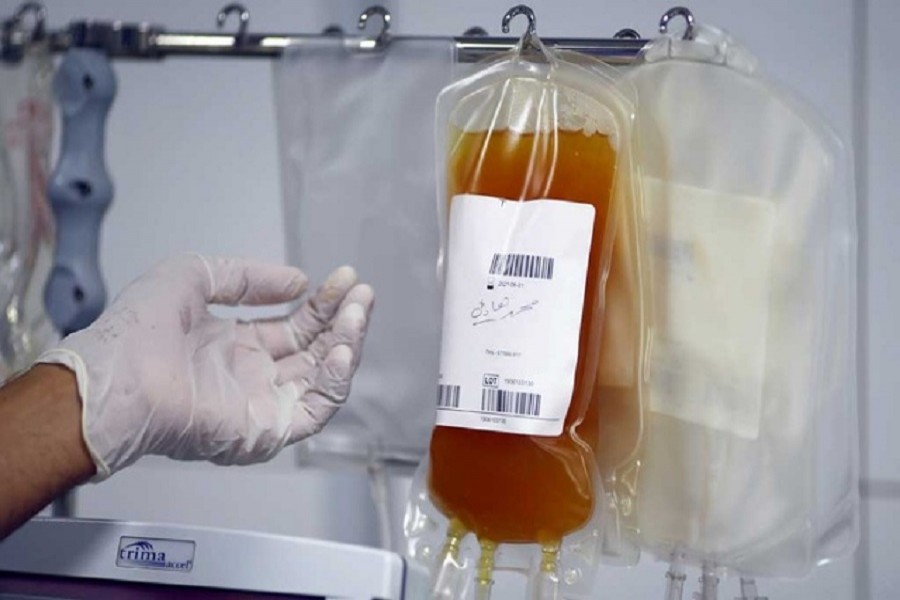Doctors in Bangladesh are leaning toward using plasma therapy for treating the severe cases of Covid-19 as it proved 'fruitful' in most cases, bdnews24.com reports.
Despite the increased use of the therapy, the Directorate General of Health Services is yet to design any policy on it.
Hospitals dedicated to Covid-19 patients have been using plasma therapy even though the national technical advisory committee on the coronavirus warned against using it without clinical trials.
A number of plasma banks emerged at a time when appeals for donating plasma from the families of severe Covid-19 patients grew louder on social media. Some hospitals are also collecting plasma and administering it to patients.
Plasma therapy will not be effective if the antibodies in the collected plasma are not measured, according to doctors.
A policy is needed immediately to discipline the process, especially when a dishonest group has appeared, said Prof MA Khan of the Hematology Department at Dhaka Medical College.
Plasma therapy is being used in severe cases, besides the clinical trials in many countries, including the US.
A lack of guidelines will enable people to adopt dishonest means to the therapy, said Prof Khan.
“Demand is much more than supply. People will spend their fortune to buy it and a quarter will exploit the opportunity,” he said.
Prof Khan is leading a team of doctors in running the clinical trials of plasma therapy at DMCH.
They appealed to the health ministry on May 20 to begin an "expanded access programme" to apply the plasma therapy to the Covid-19 patients on a small scale, besides the clinical trials, he said.
“Some patients outside the clinical trials could be given the therapy under this programme. The US has started doing it. This will be applied widely among the patients but under proper rules; everything will be documented. Doctors will decide who can receive the therapy."
"The ratio of antibodies in plasma should be a minimum of 1:160. The plasma can be administered if the antibodies are more than it. In many cases, the authority is not doing an antibody test. It has become like selling medicines from a pharmacy," said Prof Khan.
The use of plasma therapy should be allowed only after assessing the clinical trial results, said Prof Mohammed Shahidullah, president of the national technical advisory committee on Covid-19.
"We don't recommend it until the plasma therapy or some other medicines are proved to be effective through research," he said.
However, there is no problem in using the plasma therapy on a limited scale outside clinical trials, he said.
The state of plasma therapy
In many cases, Covid-19 patients after recovery are donating plasma for free, while some of them are charging for it. A patient in Kurmitola General Hospital was administered with 400 ml plasma, donated by a person with the help of Bangladesh Specialised Hospital in Shyamoli.
In another case, a family collected a bag of blood from a donor for a patient receiving treatment at Anwer Khan Modern Hospital, and had to pay for it. The family declined to disclose the amount of money.
It costs Tk 30,000 to administer a bag of plasma at Bangladesh Specialised Hospital. They do it for both inpatients and outpatients.
There is no provision to carry out antibody tests in that hospital, said a health worker at Bangladesh Specialised Hospital.
United Hospital has plasma therapy services for inpatients, which costs Tk 25,000. No antibody test is done there too.
They are collecting plasma and providing plasma therapy after conducting necessary tests, said Dr Hasan Ul Haider, director of Rajarbag Central Police Hospital.
It is not harmful for the patients and different studies showed plasma therapy to be effective on Covid-19 patients, he said.
Besides, the guidelines do not include many treatment options for Covid-19, he said when asked why they are using the therapy despite the government guidelines not approving it.
As it is used in Bangladesh now, there should be a policy and guideline for it."
They have ordered the DGHS to take necessary steps, said Habibur Rahman, additional secretary of the health ministry. "It's a technical issue and DGHS can approve it. We have forwarded it to them," he said.
Aminul Islam, director in DGHS, and Dr Abul Kalam Azad, director general of DGHS, did not respond to phone calls for comment.


